the weekly scrapbook is a collection of thoughts, reflections and experiences on what it means to navigate modern life. want to know more?
you can have a 7-day trial for a paid subscription clicking this link 💖
TW: This piece discusses topics such as body image and eating disorders, so reader discretion is advised. Overall, it is intended as a critique —please, take it as such, and don’t view any of these examples as actions to replicate.
My eating disorder started when I was eleven.
I was always a fat child. Raised by my grandparents, I spent a happy childhood being fed purely on fried food and carbs. It was fine, truly —until it wasn't.
Until kids started making fun of me and asking me if I was pregnant. Until I reached 6th grade and I pretended to be sick to skip a school trip to a water park. I already knew I was big—much taller than all my classmates and overweight—and I didn't want anyone else to see it.
It all changed when one of my friends from my judo lessons came to me in the dressing room, getting closer as if she was about to share the secrets of the Universe.
‘I think I figured out how to lose weight’, she whispered. I remember looking at her while she was taking off her judogi. She was not only skinny, but also toned. She was everything I wanted to be back then. ‘I have been skipping dinner for a month, and I have already lost 5 kg’.
By twelve, I was already sucked into the pro-ana and pro-mia Tumblr rabbit hole. My laptop was filled with thinspo pictures of really skinny strangers, and I would look at them every time I wanted to eat. I would watch that scene from Skins religiously, the one where Cassie teaches Sid how to trick everyone into thinking you are fine, you are eating, there's nothing to worry about.
I was only a kid. While my friends were playing Minecraft and watching early YouTube videos, I was skipping meals and oversleeping to avoid hunger. I was scrolling through Tumblr obsessively, looking for the next tip that would make me get rid of the fat on my hips.
By thirteen, I was already hospitalized. It's a tale as old as time: former fat child loses weight and, suddenly, everyone starts being nice to her. ‘You look so pretty,’ they all say. ‘What's your secret?’.
Starvation. Hair loss. Missed plans. Isolation. Manipulation. Obsession. Freezing hands. Bad grades. Self-hatred. And gut issues that will haunt you even ten years later, as a cruel reminder of everything you put your body through.
Was my eating disorder caused by the Internet? Definitely not. I have had body image issues since before I knew the Internet was a thing.
However, was my eating disorder encouraged by the Internet?
Oh, hell yes.
Luckily enough, the social media body image discourse started switching during my weight-gain and recovery years.
Grunge, really pale and skinny girls with marked collarbones and bruises on their legs were out. #LoveYourself, #BodyPositivity, and #MyBodyMyRules were in.
My Instagram was filled with pastel graphics about self-love, self-acceptance and diversity. During those years, the Internet felt kind of like a safe place. Of course, the fatphobia demon was never gone, but at least it seemed to be hardly punished online.
During those years—between 2016 and 2019-ish, I would say—, it felt like we were all discovering very basic things at the same time. Activism. Feminism. The fight for LGBTQ+ rights. The fight against racism. The fight against ableism. The #MeToo movement.
Maybe I was just a teenager discovering the world, but it felt as if we were all awakening simultaneously.
I remember following countless body positivity influencers. They were mostly normal women just being unapologetically themselves, but it felt revolutionary at the time.
One of the women I followed back then was Megan Jayne Crabbe. The way she shared her journey with recovery, and how proud she was of her body afterwards, healed me in so many ways I can’t even explain.
I still recommend her book, Body Positive Power, to this day. I read it twice and I am thinking about reading it again —just as a reminder of what the world is working so hard to make me forget.
Back then, ‘All About That Bass’ by Meghan Trainor was on the radio. A bit later, Lizzo was making numbers—it’s crazy how all of that turned out to be, huh?—, with banger after banger. Doja Cat was singing about keeping it ‘Juicy’, whatever that means. But at least, she was ‘eating that lunch’. And Barbie Ferreira—even before starring in Euphoria!—was everything everyone wanted to be.
Sometimes, I could sense some kind of skinny-shaming message being spread that I didn’t like, either. But that should be a topic for another piece.
It was not perfect, but it was something. Overall, chubby girls were no longer the side character or the comedic relief.
They were the main character. They were sexy. They were confident. They were mainstream role models.
After reading
’ long-form post about thinfluencers—which inspired this piece, by the way—I started thinking about how much the Internet body-image discourse has changed (again) over the past years.Every algorithm-centered digital space is now filled with white, super skinny, able-bodied women who fit the imposed beauty standard. Right now, I can’t help but wonder:
What happened to #BodyPositivity? Where are the real people?
The ones that the algorithm doesn’t push. The ones who don’t fit in the Pinterest model-out-of-duty-whatever-that-means bubble. When did the Internet stop talking about radical self-acceptance and start putting all of our insecurities under a microscope?
Two years ago, TikTok made me insecure about having a wide ribcage. What does that even mean, and why did I even care? I don’t know, to this day. Over-analyzing our features in front of a camera and posting it on the Internet for the world to see has become the new normal.
The amount of fatphobia and straight-up evilness I have seen on TikTok comment sections is terrifying enough to not come back to the platform ever again.
I have had ten-year-old students—Ten. Years. Old!— telling me they want a button nose, like the ones they see online. Telling me that now they only eat lettuce as a snack, because they want to lose weight —again: only ten. I have seen kids bullying a girl because she had perfectly normal hairy arms.
It’s terrifying. It’s like going back to 2013-14 Tumblr again.
But, this time, it’s not underground. This time, it’s normalized.
And it’s not affecting only unsupervised kids and impressionable teens. At this point, this is everyone’s problem. I had a relapse from my eating disorder during the 2020 pandemic, where I lost a significant amount of weight and I was met, yet again, with wow-you-look-so pretty’s and how-did-you-do-it?’s that made me feel as if I had done something right, after all.
Now, at 25, I still need to remind myself that I don’t need to be a pilates princess, whatever that means. It’s okay to eat carbs, and I don’t have to look like the coquette Pinterest girlies. Some outfits won’t look on me the same way they look on the super skinny, always stylish girls you see on that app… And that's okay.
But it’s not only the algorithms, though. It goes further than that. I knew, at some point, with the 2000s fashion revival—any low-rise jeans hater in the room?—, the birth of the clean girl aesthetic and the popularization of K-Pop in the west, that an important change in the beauty standard was approaching… and that I wouldn’t like it at all.
The Kardashians knew it too, by the way. That’s why they got their implants removed:
And don’t get me wrong —I love K-Pop. Well, at least I did. And only the Universe knows what kind of person I will become once all the BTS members come back from the military.
I am not one of those people who use the ‘K-Pop-industry-bad’ discourse to cover up their racism. I even lived in Seoul for a bit, so I think I know what I am talking about when I say that we need to recognize how much money this industry has made by putting their trainees and stars through hell to attain a beauty standard that is not healthy to anyone.
I agree that so many good things came with the popularization of K-Pop in the west. However, we can’t shake the negative sides of it.
How can we ignore things like the glorification of skinny bodies or the normalization of horrible, incredibly unhealthy eating habits like the IU diet (where you only eat an apple, a sweet potato and a protein shake a day)?
And before some of you say something like ‘Oh, but they are all naturally skinny!’ then tell me:
Why did Momo from TWICE explain in a live how she lost 7 kg in a week by ‘eating’ nothing else than ice cubes, feeling so weak that she cried herself to sleep because she was afraid she might not wake up the next day?
Or tell me about the alarming weight loss of some girl group members that, by the way, usually align with their groups’ comeback schedules.
ITZY have some of the most concerning cases, in my opinion. This clip of Yuna realizing how small Ryujin has gotten always breaks my heart.
(Just as a heads-up, both TWICE and ITZY are under the same company).
It’s not only K-Pop, though. Over the past couple of years, a resurgence of celebrity weight loss has been flooding the Internet. All these advocates for body positivity, curves, and being a thick girl are now losing the weight they used to say they were so proud of.
Some of them include personalities like Lizzo, Doja Cat, Meghan Trainor, Ice Spice, Billie Eilish, Barbie Ferreira, Rebel Wilson—who admitted she has used Ozempic—, Adele, Camila Cabello, Christina Aguilera, and a long etcetera of both male and female celebrities…, but mostly female.
The current Ozempic craze is more than concerning, but I am not saying everyone on this list used the drug to help them lose weight. For example, Lizzo has been posting her workout videos since circa 2019. As long as she is doing it in a healthy way, good for her!
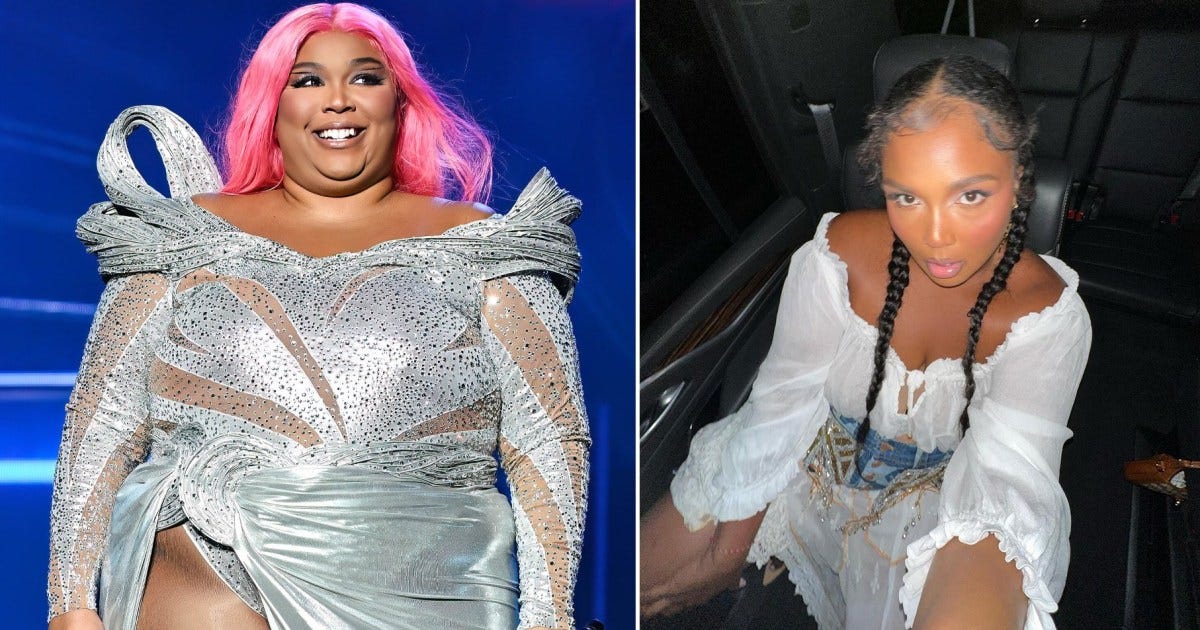
I am also, and I truly mean it when I say this, not trying to shame any of these women for losing weight. I am mentioning them to prove a point, but I feel like, overall, our obsession with other women’s bodies—whether they lose or gain weight, whether they shave or have one-night stands—should have ended by now.
I am just worried about what all of this means. If the people at the top need to be skinny to stay at the top, what kind of message are we getting from that?
Where are the role models for the girls who are not thin, for the girls who already have it hard enough having to navigate life in a fatphobic society? What are we all learning from this kind of erasure?
This is not about these celebrities as individuals —at the end of the day, we are all victims of the same system. The weight loss industry keeps growing and growing while we keep trying to shrink ourselves. Now it has rebranded itself as the wellnes industry, but it’s just the same thing —just money-hungry men feeding off our insecurities.
And I am tired of it. Every time I hear the little voice in my head that tells me I should skip a meal/buy a diet pill/get another skincare product, I imagine a rich, white man as disgusting as the villain from The Substance, laughing behind my back and feeding himself with the money I willingly give him.
The Substance reminds me of our current reality, too. The fact that Ozempic has terrible side effects and people still choose to use it to fit a certain beauty standard is dystopian. But, at the same time, it’s exactly what I was doing when I was starving myself —ruining my body in the long term to get temporary validation.
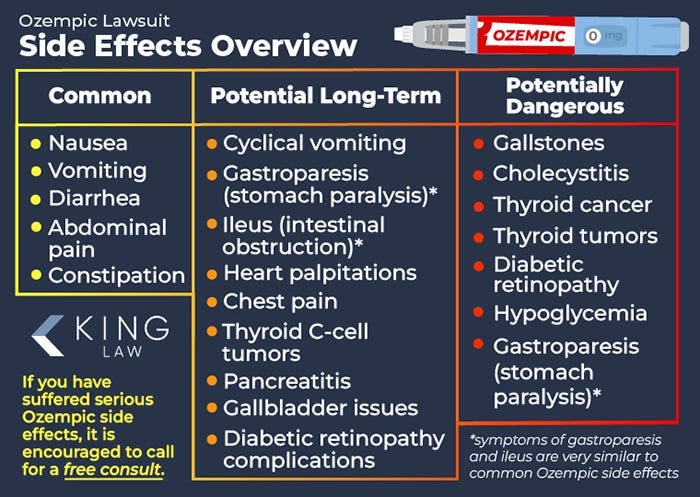
But it’s all the same. In The Substance, Elisabeth Sparkle gets the drug knowing how dangerous it can be because she would rather be in danger than feel old, unattractive, and underappreciated. It’s not about vanity —it’s about trying to adapt to a system that will reject anything and anyone who gets out of the standard.
At the end of the day, Ozempic is to fatphobia what The Substance is to ageism. A temporary fix, a life-long hell.
But a temporary fix, after all. A temporary fix that only those at the top can afford, at least for now. As South Park puts it in one of its episodes: ‘Rich people get Ozempic, poor people get body positivity’.
I just wish we lived in a world where we didn’t need temporary fixes for our bodies. I wish we didn’t need Ozempic or body positivity. I wish we could all just honor our bodies for getting us through the day, for letting us experience incredible things —eating a delicious meal, the smell after a rainy day, having sex, hugging someone we love, feeling the sun on our skin.
I just wish we lived in a world where this was enough. But, unfortunately, we don’t. So I guess it’s our responsability to try to identify who is profiting off our insecurities, and what they are doing it for.
As Naomi Wolf wrote in her book The Beauty Myth:
‘A culture fixated on female thinness is not an obsession about female beauty, but an obsession about female obedience. Dieting is the most potent political sedative in women’s history; a quietly mad population is a tractable one’.
thank you for reading! the weekly scrapbook is a reader-supported publication, so if you’d like to support my work, you can become a paid subscriber or buy me a coffee ☕ (or... matcha?) .






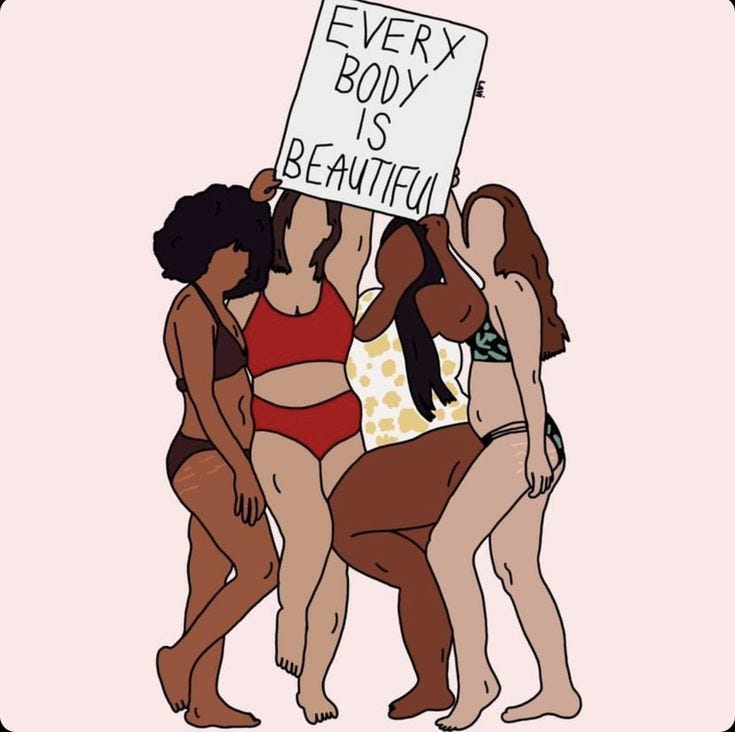
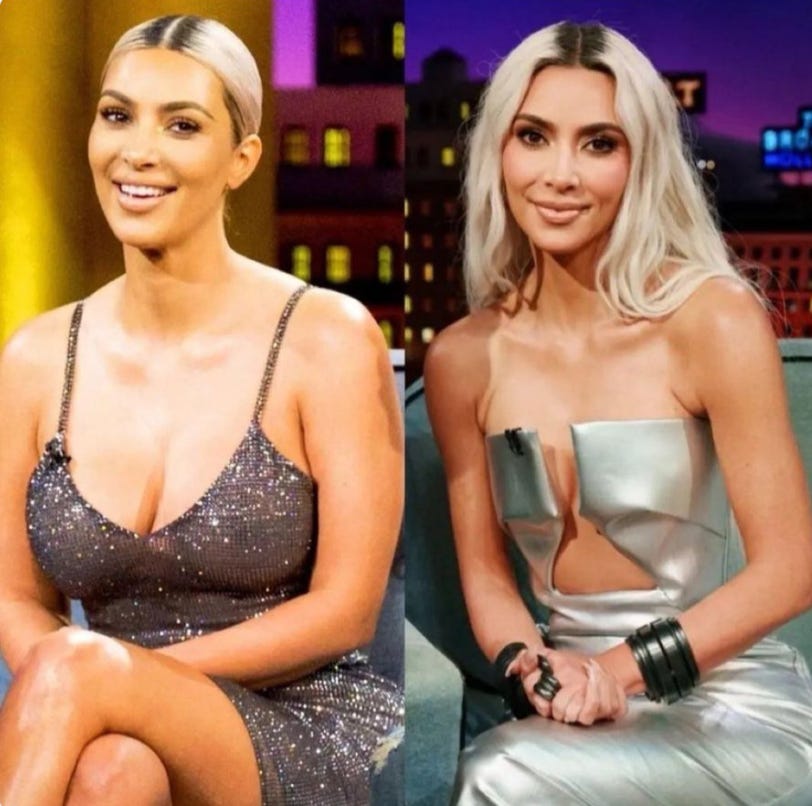
![life stories] RYUJIN SERIOUSLY LOST TOO MUCH WEIGHT - K-POP - allkpop forums life stories] RYUJIN SERIOUSLY LOST TOO MUCH WEIGHT - K-POP - allkpop forums](https://substackcdn.com/image/fetch/w_1456,c_limit,f_auto,q_auto:good,fl_progressive:steep/https%3A%2F%2Fsubstack-post-media.s3.amazonaws.com%2Fpublic%2Fimages%2F06a01fac-2863-40da-82f0-7adc2637cb45_480x480.png)
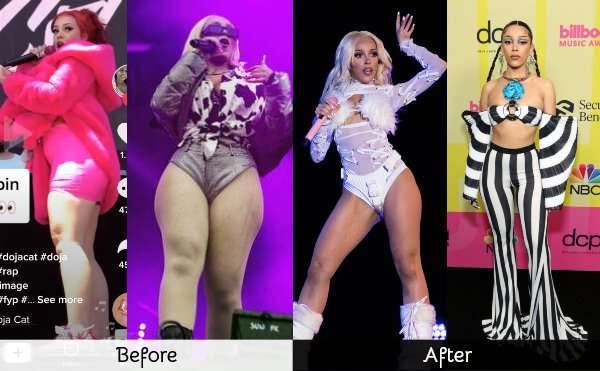
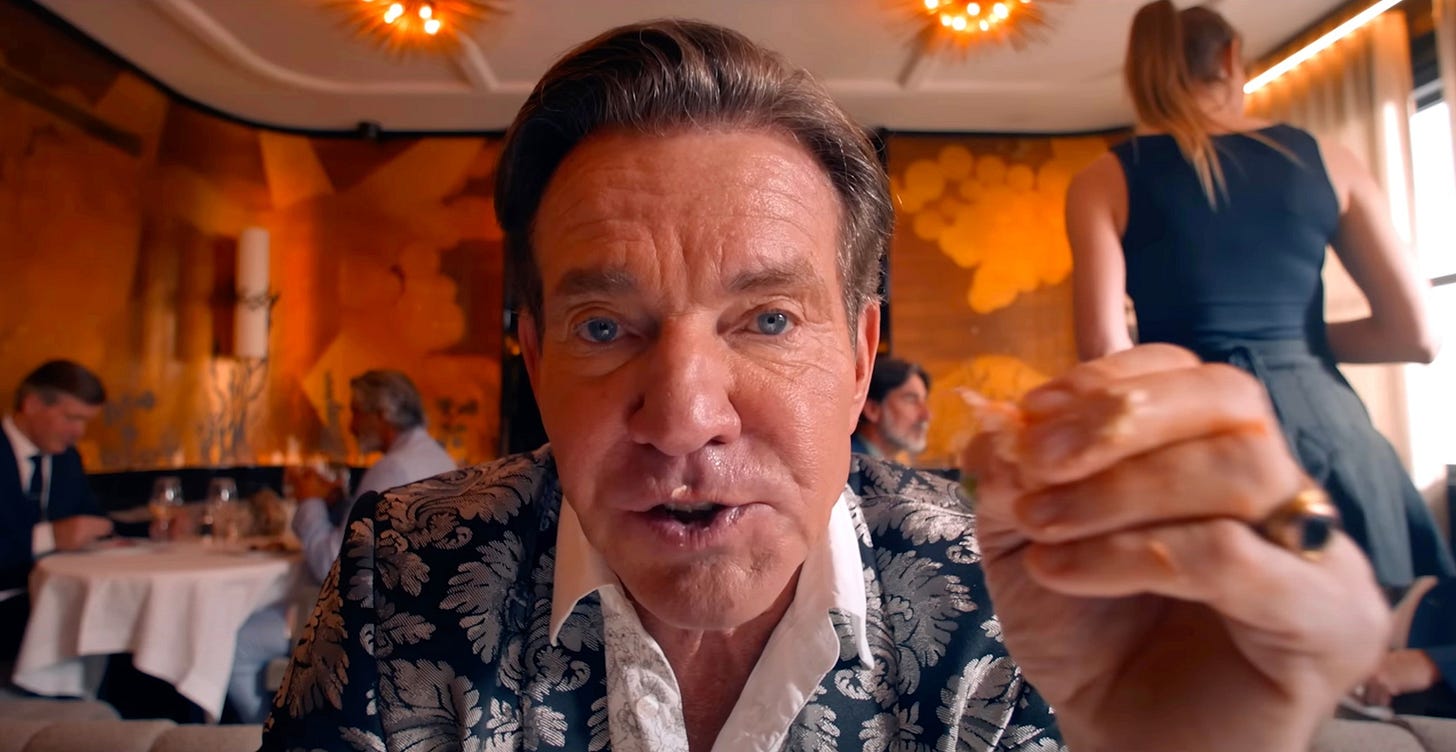
A very brave post. When you lose a lot of weight, you are never skinny. You are ex-fat. You carry the trauma from the isolation, the bullying, the horrible comments and the self-hatred inside you. It's a lot of hard work to heal. Thank you for sharing your story.
The last few years have been so disheartening. Being a child during the early 2000s “nothing tastes as good as skinny feels” era and a teen during the skinny grunge tumblr era was so hard. And it felt like such a breath of fresh air to get to the body positivity era. Like finally society has figured it out! These past few years have been so disappointing watching “thin” come back in style, and realizing the societal shift wasn’t permanent.